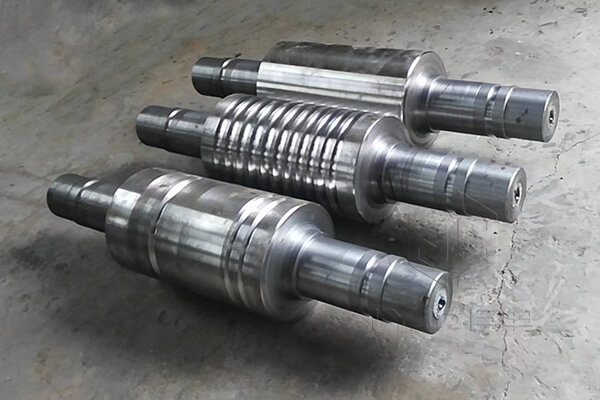Rolling mill roll, a roll is a metallic cylinder or drum that is used in a rolling mill to shape metal products such as sheets, rods, bars, rails, or beams. Rolls are made from various materials, including cast iron, cast steel, and forged steel.

The rolls in a rolling mill are usually mounted horizontally and can be driven by an electric motor or other power source. A typical rolling mill has two or more sets of rolls, which rotate in opposite directions at a constantly increasing speed to reduce the thickness of the metal being rolled gradually. The rolls apply pressure on the metal, causing it to deform and shape into the desired form.
Rolls come in various sizes and shapes depending on the application-specific requirements. The shape and size of the rolls can vary based on the type of metal being rolled, the required thickness, and the final product's shape and dimensions.
The quality of the rolls is critical to the overall performance and reliability of the rolling mill. Rolls must be made from high-quality materials, must be well-machined, and must be appropriately maintained to ensure that they can withstand the high stresses and strains of the rolling process and deliver high-quality, accurate, and consistent results.
The number of rollers used in a rolling mill depends on the type of mill and the type of metal being rolled. Some rolling mills have just one or two rollers, while others can have as many as 20 or more rollers.
For example, a two-high rolling mill has two rollers that rotate in opposite directions to deform the metal being rolled. A three-high rolling mill has three rollers, while a four-high rolling mill has four. In a four-high mill, two of the working rolls are supported at the top and bottom by back-up rolls, which provide additional support and stability during the rolling process.
In some specialized rolling mills, there may be six or more rollers. For example, a cluster mill has several pairs of backup and work rolls that are arranged in a cluster to enable the rolling of different types of metals with greater accuracy and efficiency.
Overall, the number of rollers used in a rolling mill depends on the type and purpose of the mill and the desired product specifications. The more complex and specialized the rolling process, the more rollers are required to achieve the desired results.
The rolls in a rolling mill can be made from various materials depending on the application and specific requirements. Some common materials used for roll production include:
Cast iron: Cast iron rolls are commonly used in hot rolling applications, such as in steel mills. Cast iron rolls have good wear resistance and are relatively low cost.
Forged steel: Forged steel rolls are made from high-quality steel and are used in applications requiring greater strength and durability. Forged steel rolls are commonly used in cold rolling and sheet rolling applications.
Cemented carbide: Cemented carbide rolls are used for rolling difficult-to-form metals such as titanium and aluminum alloys. Cemented carbide rolls have excellent wear resistance and are very hard, making them well-suited for high-pressure applications.
High-speed steel (HSS): HSS rolls are made from a high-speed steel alloy and are commonly used in both hot and cold rolling applications. HSS rolls are known for their excellent wear resistance and are well-suited for high-speed rolling applications.
Powder metallurgy (PM) composite rolls: PM composite rolls are made from a combination of materials, such as tungsten carbide, ceramics, and metallic binders. PM composite rolls are highly wear-resistant and are commonly used in cold rolling applications.
The roll material selection depends on various factors, such as the type of metal being rolled, the required accuracy, and the rolling mill's operating conditions. By selecting the appropriate roll material, rolling mills can achieve consistent and high-quality output while minimizing potential damage to the rolling mill components.
Please send us your request and we reply to you with in 24 hours.
Submit Request